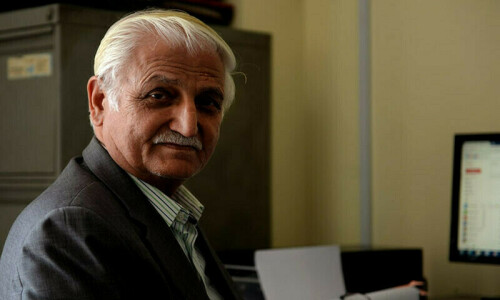THERE is good news about books. The Pakistan Publishers and Booksellers Association's fourth international book fair in Karachi in December was quite a crowd puller. The fair has now emerged as a welcome annual feature of life in this cosmopolitan city and the organisers claim that visitors and sales have been on the rise.
What is a more positive development is that the link between publishers/booksellers, libraries and readers is now receiving recognition. Concerted efforts are being made to promote the intellectual activity of reading by giving a boost to publishing and libraries.
Each is linked to the other. But in some areas progress has been too slow for most people's liking. According to a PhD thesis by Raees Ahmad Samdani, Pakistan has nearly 7,000 big and small libraries today.
In 1989, when the last survey was conducted by Dr Anis Khurshid, the doyen of library scientists of his time, this figure was 6,000. The rise has not been that impressive. It is the individual buyer, according to Ameena Saiyid of Oxford University Press (OUP), who is giving a boost to book sales. According to another report — yet to be confirmed — the Senate's standing committee on libraries is drafting the long overdue library law.
Another event which caught the public's attention was the National Book Foundation's ceremony in Karachi where 18 'book ambassadors' — described as people who wield influence in society — were awarded asnad to further the cause of reading. Two Dawn readers, however, were quick to express their scepticism about the success of this scheme. I share their views. People don't read books because they are exhorted by high-profile people to do so. This specially holds true in a country where people come and tell the award-winning author of Burnt Shadow, Kamila Shamsie, “I have seen your latest book”. They have not read it.
The fact of the matter is that a change is in the air and we should capitalise on it. This can be done by increasing substantially the number of readers — the critical mass. This will create the pressure from below for more and cheaper books to be published and libraries to be opened. Haven't we already missed the bus? We can still catch up by introducing books to children in a big way so that they acquire a lifelong reading habit.
This process calls for a lot of patience and effort. It has been observed that mothers who spend time sharing books with their children make them interested in them. Just giving them books is not enough. What also matters is the time they spend making reading an interactive activity — something which makes the reader feel, “I am not alone”, as Alberto Manguel, the author of A History of Reading, felt when he realised that the “pleasure, responsibility and power he felt from reading” was shared by others.
There are numerous ways of sharing the joys of reading. Enterprising schools and teachers encourage this exercise by putting up reading trees on the classroom board and pinning small leaf-shaped cards bearing the name of the students and the title of the books he reads. A race to collect more leaves than his classmate prods a child to read. Events such as readathons, which are sponsored reading campaigns, also encourage children. It is the competitive spirit that drives them as there is an award waiting at the end of the day.
But reading is an intellectual exercise and great are the ones who can protect the sanctity of books by encouraging the readers to regard the pleasure of reading as a reward in itself.
A person who did this best was Shafiqa Fikree, the headmistress of St Joseph's Convent School, who passed away recently. Generations of her students imbibed the pleasure of reading from her. She set up a classroom library in the class she was the teacher of and was actively involved in the selection of books, engaging girls in meaningful discourses that centred on a book, and making them profoundly interested in the written word.
Hundreds of young alumni of St Joseph's Convent who are addicted to books are the enduring legacy that Ms Fikree bequeathed to our society. A bibliophile herself she knew how to transmit her love of books to her students.
What is not generally realised is that book reading is an enduring habit if it is a shared activity. There are few readers who do not like to share their reading experience with a friend. This collective interest helps sustain book clubs where they are set up.
This would also explain the success of Oprah Winfrey's Book Club in her television show. So powerful has been the influence of this club that any title selected by Oprah instantaneously becomes a bestseller. An author remarked that she makes reading look such a democratic exercise.
A small experiment I am conducting will hopefully prove this point. Every Saturday, about 15 children of The Garage School in Neelam Colony gather for a 'book hour'. They select books they want to read from the library. After completing a story, they discuss what each of them has read. The discussions are lively with an increasing number of children participating. As the facilitator, I give the discussion a direction.
These book readers from a low-income basti will hopefullyprove that book reading is more than an individual act. A History of Reading points to this reality in a chapter titled 'The author as reader'. Here we are told how it was fashionable for authors to hold public readings of their works — some lasting three days — before they were published. The audience — a privileged one — was considered to be rude if it remained silent throughout the session and did not express an opinion.
To show how reading is an interactive exercise, the author observes that his book “fortunately has no end”. After the final chapter a few pages are left blank for the readers to add a few of his own thoughts on reading. What an ingenious gesture!
zubeidam2@gmail.com











































